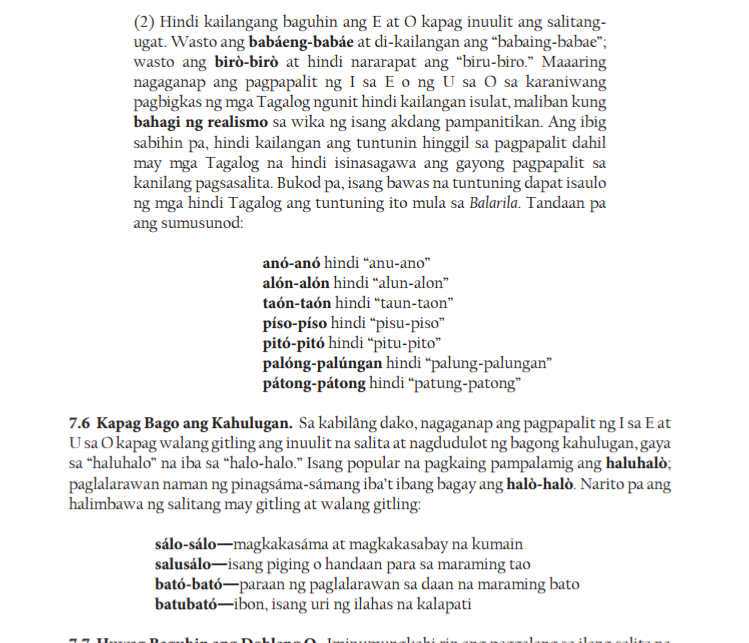@banyaga02
> 2. Baka makagawa ako nito (correct)- adding adverb, baka.
> BakaNG makagawa ako nito (incorrect)
> Baka NA makagawa ako nito (incorrect)
"Baka" is "maybe/might be".
Baka (might be) makagawa (to be able to make) ako (I) nito (this). = I might be able to make this.
Baka NA = BakaNG = Maybe, that is
Bakang (might be, that is) makagawa (to be able to make) ako (I) nito (this). = I might be, that is, to be able to make this. - Does not sound right.
> 5. PwedeNG makagawa ako nito (correct)
> Pwede NA makagawa ako nito (correct) - just by adding linker "ng/na" it becomes grammatical? Why is
> linker very important here to make the sentence grammatical? But in no. 4, "baka" is not linked by
> "na/ng" and if you add ng/na after baka it becomes incorrect?
Pwede NA = PwedeNG.
"Pwede" is "can/possible". "Pwedeng makagawa" = "pwede na makagawa" = "possible, that is, to be able to make". "Pwede" functions as a modifier of "makagawa" (possible to make), hence the need for the linker "na".
Pwedeng makagawa ako nito = (Lit.) I possible to make this = I can make this. - "Pwede" modified "to be able to make" that's why it became "can make".
Baka makagawa ako nito = I might be able to make this. - "Might be" does not modify "to be able to make" that's why it did not change it.
> 6. Maaari...makagawa ako nito (correct) - adverb, maaari
> Maaaring makagawa ako nito (correct)
> Maaari na makagawa ako nito (correct)
> - with or without linker both sentences are correct.
Â
"Maaari" is also "can/possible". The same explanation for "pwede" applies here.
However, your first sentence "Maaari...makagawa ako nito" is NOT correct.
> 7. Sana makagawa ako nito (correct)
> Makagawa sana ako nito (correct)
> Makagawa ako nito...sana (correct)
Â
> This is the most confusing part for me. "Makagawa" is not only preceded by adverb "sana" it could also
> be placed after "makagawa" or even at the end of the sentence.
Â
"Sana" is "I hope/hopefully". However, since "makagawa ako nito" needs a verb, "sana" becomes "I hope" here and it is the independent clause . It makes the sentence complete.
Sana makagawa ako nito. = (Lit.) I hope I to be able to make this/something like this. = I hope I can make this/something like this.
Even if "sana" is placed after "makagawa" or at the end of the sentence, the meaning of the sentence will not change.
I hope I can make this/something like this.
I can, I hope, make this/something like this.
I can make this/something like this, I hope.
> I've observed that Tagalog has flexible rules when it comes to lexical category of a word.
Â
> "Ganda" in most Tagalog grammar books is categorized as adjective and nouns but never as a verb and
> adverb. Same thing with "ano" and "sino." They are alaways categorized as "question markers" but
> when I read some Tagalog books they also function as verbs.
Â
> Example:
Â
1. Kulang man ang mga ito sa GANDA, nakikita naman ang tibay at tatag ng mga ito. = Even if these lack BEAUTY, you can see their durability and sturdiness. - noun
Â
2. Ang GANDA n'ya = She is SO/VERY BEAUTIFUL - simple adjective - "Ganda" here is an adjective only because "ang" functions as an intensifier of the adjective "maganda". "Ang" is "so/very" here.
MAGANDA ka. = You are BEAUTIFUL. - adjective
ANG GANDA mo. = You are SO BEAUTIFUL. - adjective (Intensified adjectives take the possessive form of the noun/pronoun.)
Ang GANDA mo ay walang katulad. = Your BEAUTY is incomparable. - noun
3. GANDAhan mo naman ito = Do this the best way you can. - verb - Don't forget that "ganda" is a root word. If you place a "ma-" before it, it becomes the adjective "maganda" (beautiful). If you add the suffix "-han" to it, it becomes the verb "gandahan" (to work on something the best way possible).
Â
> 4. MaGANDA siya - affixed adjective
Â
5. MaGANDA siya manamit - adverb - This sentence is incorrect. "Maganda" is a modifier of "manamit" (the manner of dressing up), hence it needs the linker "na". This sentence should be "MaGANDA siya NA manamit" or "MaGANDA siyaNG manamit" (He/She dresses up nicely/beautifully).
Â
* ma adjective can also functions as an adverb. - Yes, but "beautiful" becomes "beautifully" as an adverb.









